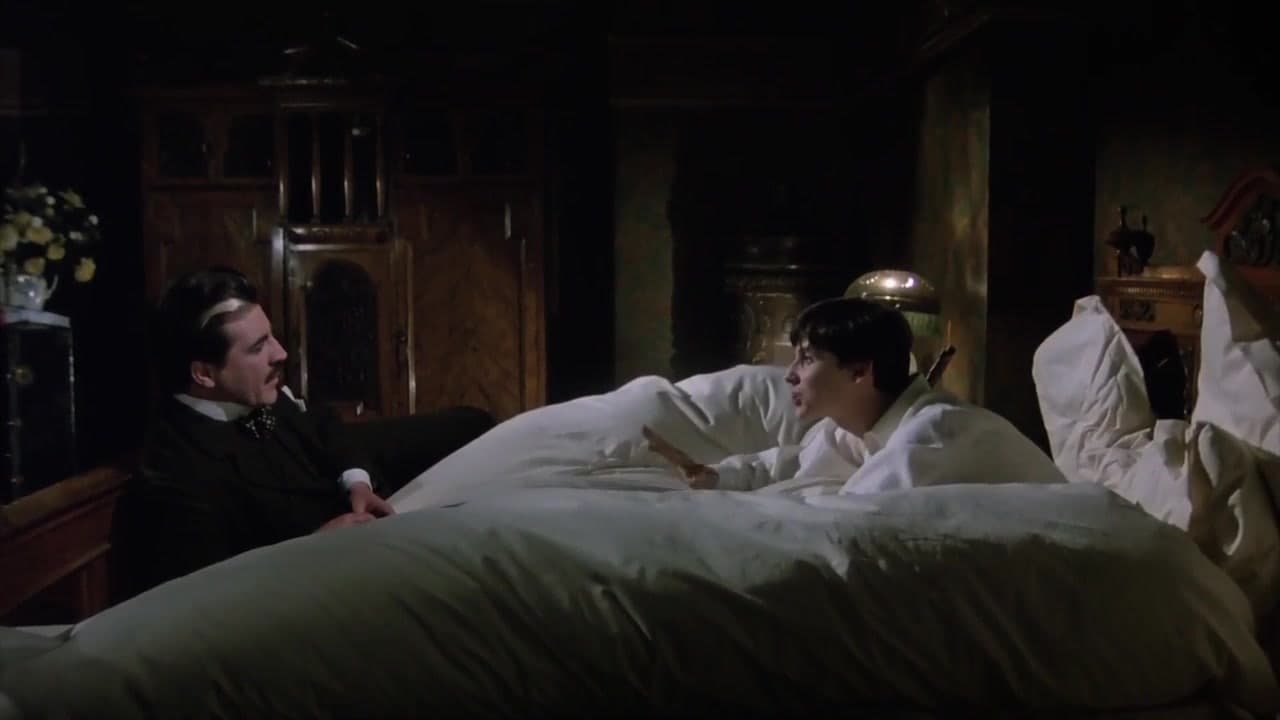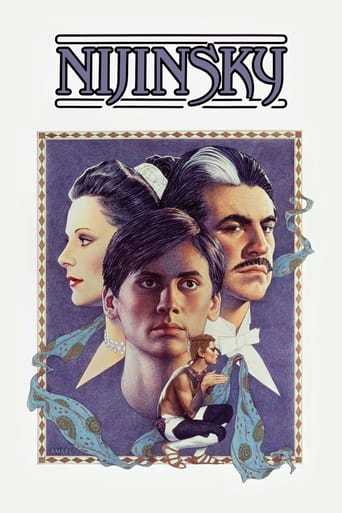




Very very predictable, including the post credit scene !!!
View MoreAn Exercise In Nonsense
If the ambition is to provide two hours of instantly forgettable, popcorn-munching escapism, it succeeds.
View MoreIt's a movie as timely as it is provocative and amazingly, for much of its running time, it is weirdly funny.
View MoreAcclaimed ballet dancer Vaslav Nijinsky, the "Polish peasant" who became the toast of Europe in the early 1900s, isn't very well served by this meandering biography which looks and sounds good but seems internally stultified. Nijinsky (played as a spoiled child by newcomer George De La Pena) attempts to extend his talents to the choreography of his latest showcase, under the tutelage of his lover and partner Sergei Diaghilev (Alan Bates), but cracks under the enormous pressure to be brilliant; meanwhile, a budding ballerina schemes her way into Nijinsky's arms after the star and his impresario have a romantic falling-out. Director Herbert Ross, apparently still riding the high from his 1977 ballet-themed drama "The Turning Point", has no new ideas on how to stage an electrifying or kinetic dance performance; the music direction is strong, however the magic of a timeless presentation is missing (what should have been the movie's strongest asset is in fact its weakest link). The temperament of artists in general is well-observed (if a bit over-the-top), however the love story between dancer and producer fails to come off. 1980 may still have been too early in the game to show passion between two men; Ross gives us a chaste rendering of it, followed by what seems like years of sniping and jealousy between the couple. Leslie Browne (a hold-over from "The Turning Point") never begins to suggest the cunning ambitions of a woman who hoped to 'change' Nijinsky', while the passion in that heterosexual union is confined to a single scene. What was everyone so bashful about? A brilliant little light show during the end credits is far more sparkling than anything in the rest of the film! *1/2 from ****
View MorePurportedly factual biography of head strong and gay ballet dancer Nijinsky (George De La Pena). It deals with his slow descent into madness and his love for his manager (Alan Bates).Lavish, well-done movie. I saw it way back in 1980 on opening night in a huge theatre in Boston. It was virtually empty. It was publicized to the hilt but it seems nobody had an interest in a ballet movie. Too bad.It was well-acted and the dancing by Pena was just superb.My only complaint is the ridiculous R rating. It was given that because of a few (mild) kisses between Pena and Bates. Back in 1980 male on male kisses was enough to give a film an R rating and Hollywood wouldn't go any farther in portraying a gay relationship (purportedly Pena, who is straight, was petrified of doing these scenes). Everything else is PG material here. The rating really should be lowered for wider acceptance.Worth catching.
View MoreThis little-seen film by Herbert Ross chooses to focus on the rise and fall of Vaslav Nijinsky, petulant and superb dancer, and his stormy relationship with his producer-lover, Sergei Diaghilev. This story from with the heart of Ballet Russes has been well-documented before and here we see the descent into madness of a great, if unhinged artist.George De La Pena plays the title role, and his dancing is a dream. Alan Bates is excellent as Diaghilev, all repressed passion and deep thoughts. The film tries its best to portray this unorthodox relationship with the ballet at its core, but doesn't quite get there - a sign of the times, perhaps? A strength of 'Nijinsky' is the dance sequences which are replicated as they would have originally been performed, right up to the scandalous performance of the Fawn piece. The scenes where the unhappy dancer is confined to an asylum have less power but are as valid as any other sequence in the film.
View MoreWhatever the facts may have been, the screenplay writers here have chosen to interpret the end of Nijinsky's dazzling career and his descent into madness, as being caused by the end of his romantic relationship with Diaghilev. An interesting premise - that what appeared to most people to be a simple case of a "dirty old man" exploiting a young man's ambition (or perhaps an ambitious young man exploiting an older man's lust), was in fact a genuine love affair. They weren't using each other, they genuinely loved each other.Sadly, in 1980, it appears the film-makers were not brave enough to explore this fully enough for the film to work. The characters talk about passion a lot, but we don't see it much. Indeed the only love scene between the two men involves a couple of little kisses with a handkerchief held to their lips! How wonderful it would have been to see these two men genuinely passionate with each other - physically and spiritually - and how they managed to turn that passion into great works of art. This way we could understand Nijinsky's devastation when Diaghilev rejects him. As it stands, it seems to come from nowhere.This is no fault of the actors. Both Alan Bates and George De La Pena do what they can, with the scenes that they have. What a shame the film wasn't made a few years later, when gay relationships could be explored on screen more completely. This could have been one hell of a film. As it is, the ballet reconstructions are excellent and the costumes superb. Performances are strong, with the possible exception of Leslie Browne, who is a little out of her depth here as the scheming rich girl chasing Nijinsky. She fared much better in Herbert Ross' earlier ballet film THE TURNING POINT.Herbert Ross was a terrific choice to direct the film, having been a professional ballet director and choreographer, and the film has a superb sense of period and great style. But the heart is missing. The racing heartbeats of two men, and two great artists, madly in love.
View More